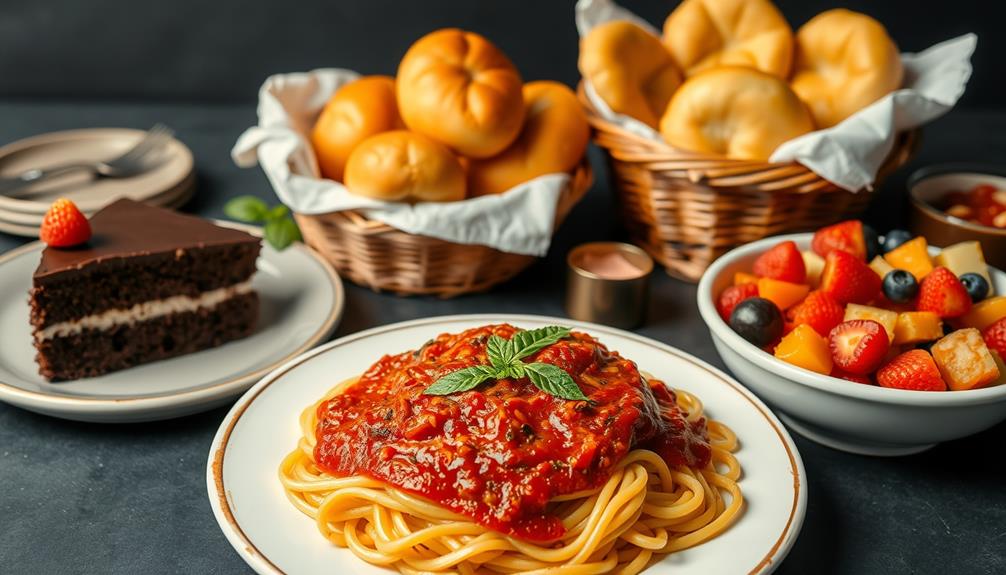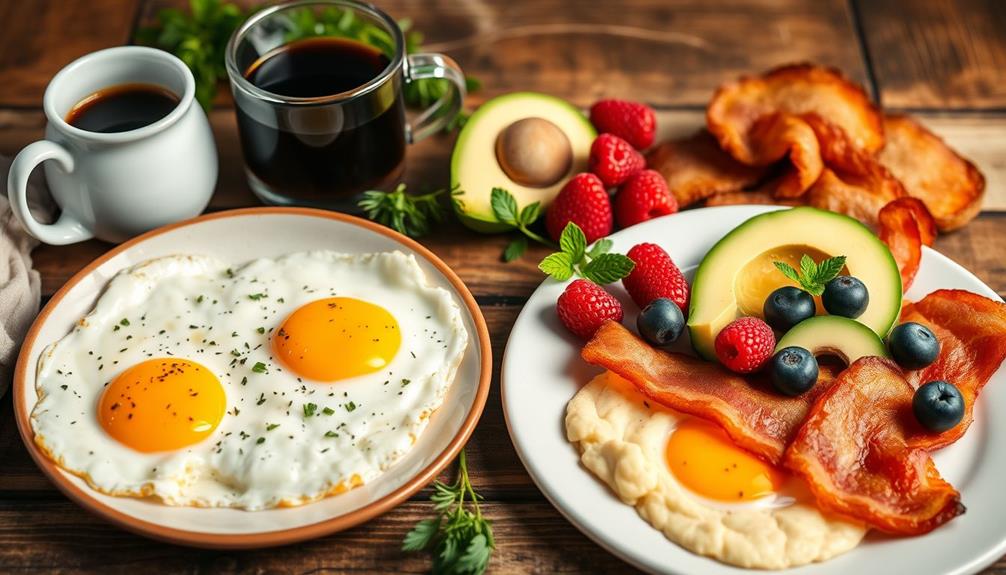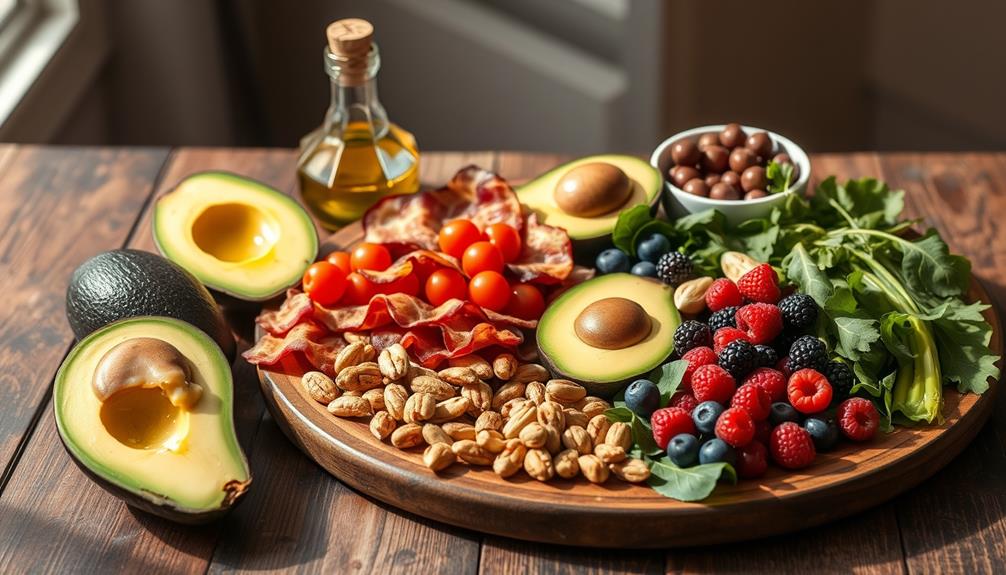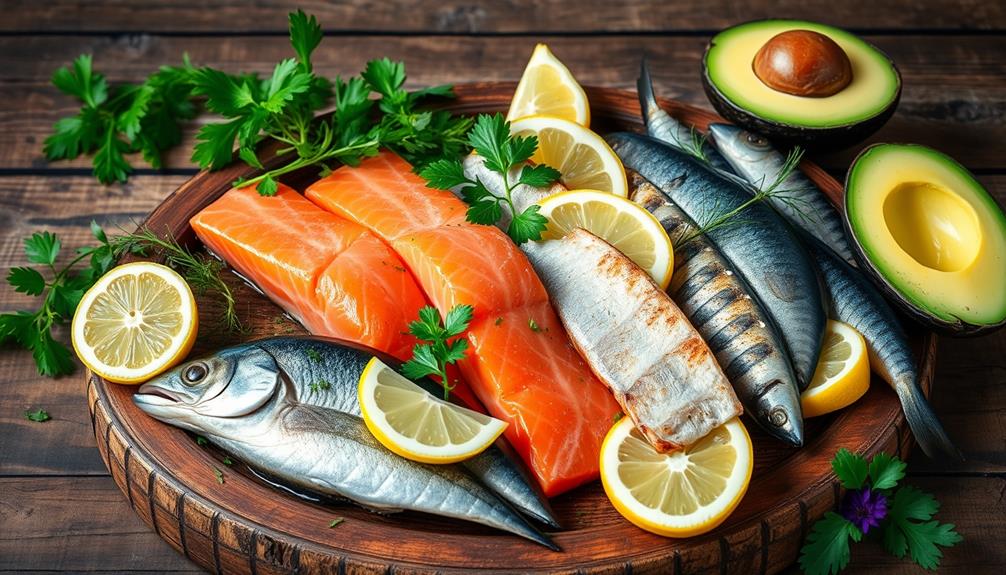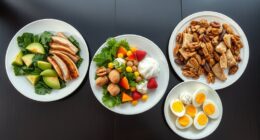When you're on a keto diet, you should steer clear of high-carb foods. This means avoiding grains like rice and wheat, as well as starchy vegetables such as potatoes and corn. High-sugar fruits like bananas and grapes are also off-limits. Processed snacks and sugary drinks, including sodas and fruit juices, can quickly disrupt your ketosis. Don't forget to skip sweetened coffee drinks and high-carb alcoholic beverages too. By cutting these from your diet, you'll stay on track. Want to uncover more tips and tricks to maximize your keto journey? There's plenty more to discover! And don’t forget about nuts on keto! While they are a great source of healthy fats and protein, you’ll want to be mindful of which kinds you reach for. Stick to low-carb options like almonds, peanuts, and macadamia nuts, and steer clear of higher carb choices like cashews and pistachios. Nuts can be a satisfying and convenient snack to have on hand while following a keto diet.
Key Takeaways
- Avoid grains like rice, wheat, oats, and barley due to their high carbohydrate content.
- Steer clear of starchy vegetables such as potatoes, corn, and sweet potatoes that can hinder ketosis.
- Limit high-sugar fruits like bananas, mangoes, and grapes, which can significantly increase carb intake.
- Refrain from processed foods, including chips and baked goods, as they often contain refined carbs and added sugars.
- Skip sugary drinks, including regular sodas and fruit juices, which can spike blood sugar levels and disrupt ketosis.
High-Carb Foods to Avoid
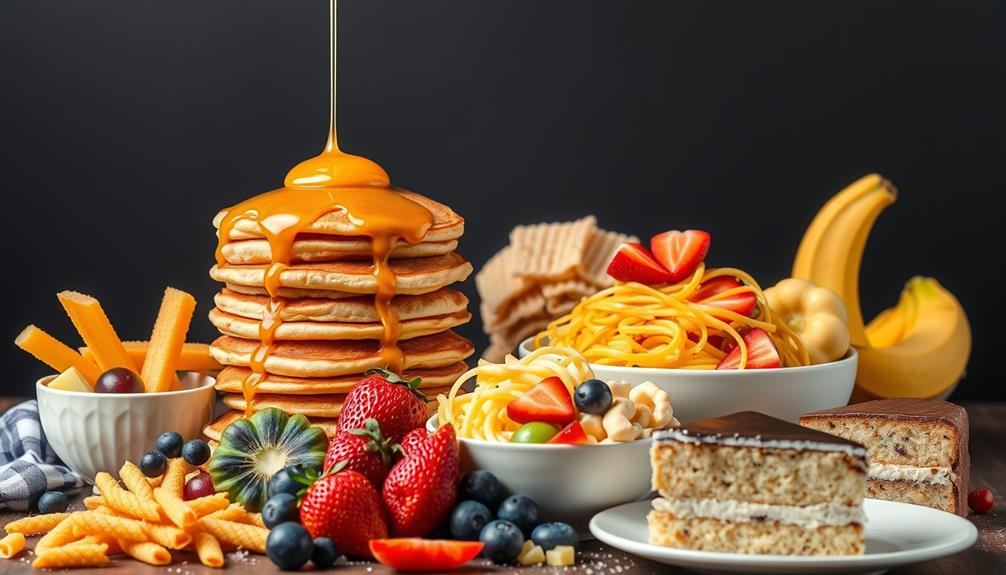
When you're on a keto diet, it's crucial to dodge high-carb foods that can throw you out of ketosis. First and foremost, you should avoid grains like rice, wheat, oats, and barley. A mere half-cup of rice packs about 26.5g of carbs, which can quickly derail your carbohydrate intake.
Additionally, understanding potential side effects of certain diets can help you make informed choices—cold medications overview might provide insights relevant to overall health. Starchy vegetables are another culprit; a medium potato can contain around 37g of carbs, pushing you past your daily limit.
You also need to steer clear of high-sugar fruits such as bananas (24g net carbs), mangoes (22g net carbs), and grapes, as they can greatly increase your overall carb count. Processed foods, including chips and baked goods, often hide sugars and can exceed 15g of carbs per serving, making them unsuitable for a ketogenic diet.
Lastly, sugary drinks, like regular sodas with about 36.8g of sugar per can and fruit juices, are loaded with carbs that can spike your blood sugar levels. By being mindful of these high-carb foods to avoid on a keto diet, you'll stay on track and maintain ketosis effectively.
Sugary Snacks and Beverages
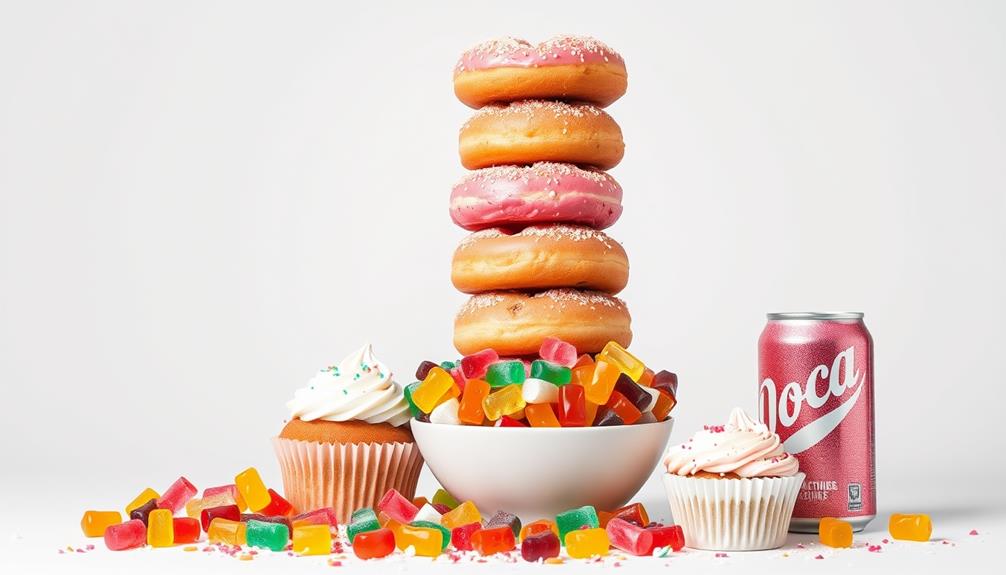
Sugary snacks and beverages can sabotage your progress on a keto diet, often packing in more carbs than you'd expect. Many popular sugary snacks, like candies, cookies, and pastries, contain high levels of sugar, often exceeding 20 grams of carbs per serving.
Additionally, certain beverages, including fruit juices, can be misleadingly marketed as healthy options but can actually disrupt ketosis due to their high carb content fruit juices can contain hidden sugars. Consuming these can disrupt ketosis and hinder your weight loss efforts considerably.
Beverages are another hidden culprit. Regular soda can have up to 39 grams of sugar per can, causing drastic spikes in blood sugar levels.
Even fruit juices, often labeled as "natural," can contain up to 30 grams of carbs per cup, which is unsuitable for a ketogenic lifestyle. Sweetened coffee drinks and flavored teas frequently have added sugars, with some large servings exceeding 50 grams of carbs. This makes them a poor choice when trying to maintain ketosis.
Alcoholic drinks aren't off the hook either. A piña colada can contain around 32 grams of net carbs due to its high sugar content.
To stay on track with your keto journey, steer clear of these sugary snacks and beverages that can easily derail your progress.
Starchy Vegetables and Fruits
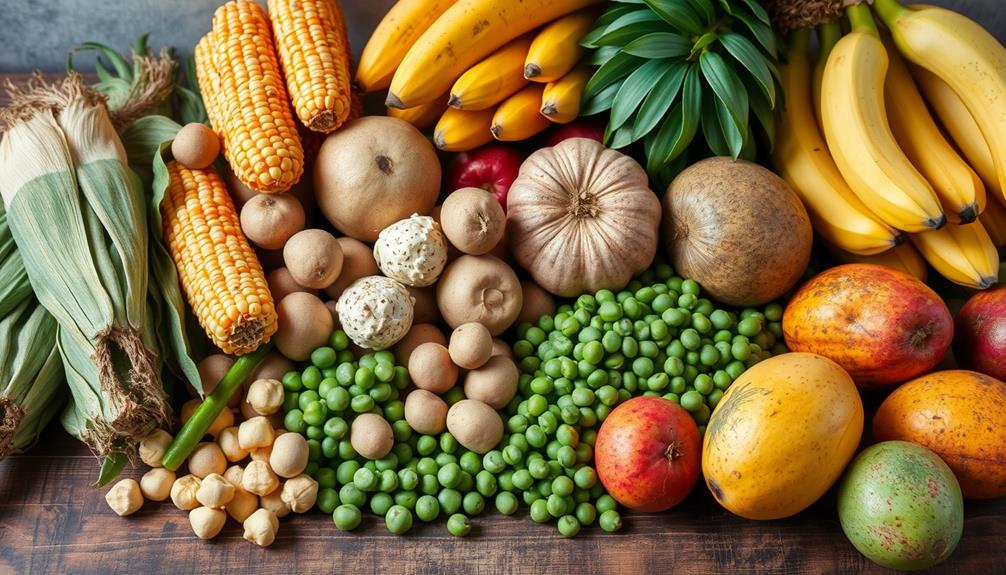
Starchy vegetables and certain fruits can quickly sabotage your keto diet, packing in more carbs than you might realize. Foods like potatoes, corn, and peas are loaded with carbohydrates; a medium potato alone can contain over 30 grams of carbs, easily exceeding your daily limits on a ketogenic diet.
Sweet potatoes are particularly problematic, offering about 20 grams of net carbs per medium-sized serving, making them unsuitable for maintaining ketosis. Additionally, it's important to monitor your intake of processed foods, as they often contain hidden sugars and starches that can disrupt your progress. For effective cleaning solutions, consider best vacuums for dust removal to keep your environment allergen-free.
When it comes to fruits, steer clear of high-carb options like bananas, which have around 24 grams of net carbs, grapes with 17 grams, and mangoes at 22 grams. These can spike your blood sugar levels, putting you at risk of falling out of ketosis.
Dried fruits, such as raisins and Medjool dates, are even more concentrated sources of sugar, with a single date packing about 18 grams of carbs.
Additionally, legumes and beans like lentils and chickpeas are high in carbohydrates as well. A cup of cooked lentils contains around 20 grams of net carbs, making them inappropriate for your low-carb lifestyle.
Keep these starchy vegetables and high-carb fruits off your plate to stay on track with your ketogenic diet.
Processed and Low-Fat Products
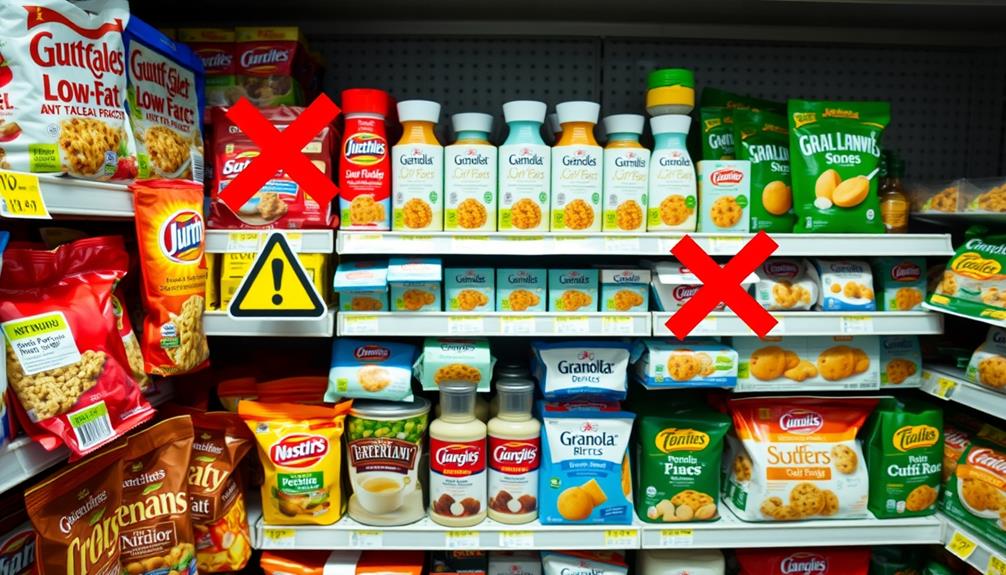
Following a ketogenic diet means being vigilant about hidden carbs, which often lurk in processed and low-fat products. Many processed foods, like chips, crackers, and baked goods, are loaded with refined carbs and added sugars, which can disrupt your ketosis and push you over your daily carb limit without you even realizing it.
Additionally, understanding the brewing methods for coffee can help you select low-carb beverages that align with your dietary goals.
Low-fat products are another pitfall. To make up for the lack of fat, they often contain high amounts of added sugars. For instance, flavored yogurts can pack up to 20g of carbs per serving, making them unsuitable for your diet.
Similarly, snack foods marketed as "healthy," such as granola bars, frequently exceed 20g of carbs, undermining your efforts to stay in ketosis.
Don't overlook packaged meats either. Sausages and deli meats can be high in sodium and unhealthy fats, contributing to water retention and other health issues.
Additionally, common condiments like ketchup and barbecue sauce are often heavy in sugar, with ketchup having around 3g of carbs per 9g packet. Be cautious with these products to maintain your keto goals.
Alcoholic Drinks and Their Impact
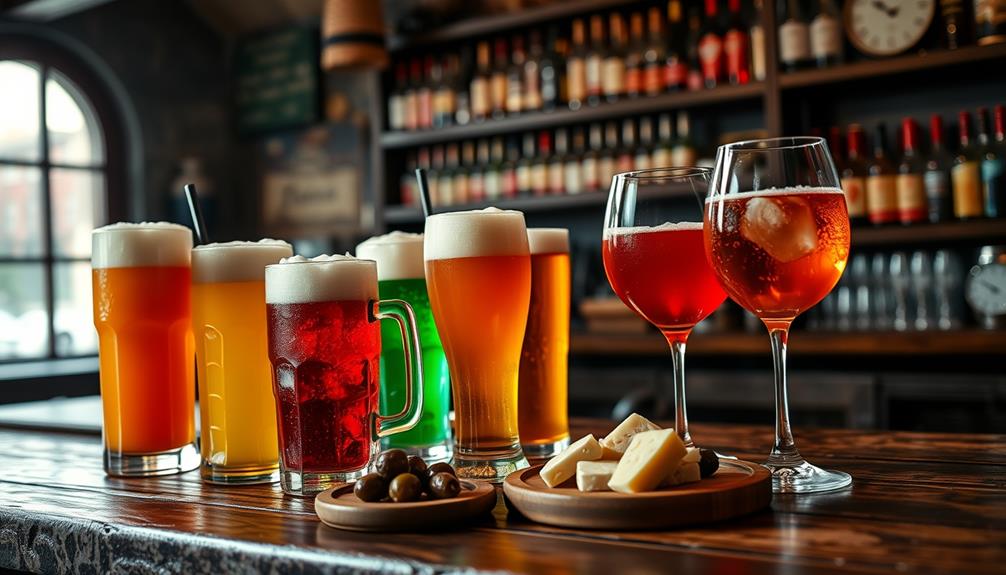
How can a night out impact your ketogenic journey? Alcoholic beverages can be tricky when you're trying to stay in ketosis. Even if you choose low-carb options, the effects of alcohol can derail your weight loss goals.
Understanding common financial terms can help you manage your budget more effectively, just as knowing your limits with alcohol can help you stick to your diet.
- Light beers can have around 6 grams of carbs per 12 oz can.
- Many cocktails, thanks to sugary mixers, can soar over 30 grams of net carbs.
- Hidden carbs in flavored spirits may add another 5-10 grams per serving.
While you might think a low-carb drink is safe, moderation is key. Overindulging can impair your body's ability to maintain ketosis and lead to dehydration, especially on a ketogenic diet.
Sweet and dessert wines are particularly high in sugar, often exceeding 20 grams of carbs per serving, which can spike your blood sugar and disrupt ketosis.
When you're out, keep an eye on those hidden carbs lurking in flavored spirits and mixed drinks. Stick to straight spirits or low-carb options like vodka with soda—but remember, even those can impact your progress if you're not careful.
Prioritize your goals and drink wisely!
Frequently Asked Questions
What Foods Cannot Be Eaten on a Keto Diet?
On a keto diet, you can't eat high-carb fruits like bananas and mangoes, starchy vegetables like potatoes, grains such as bread and pasta, sugary condiments, or processed snacks full of added sugars.
What Are the Worse Foods on Keto Diet?
Isn't it frustrating when certain foods sabotage your goals? The worst foods on a keto diet include high-carb fruits, starchy veggies, sugary drinks, processed snacks, and grains. Avoid them to stay in ketosis!
What Foods to Eat on a Keto Diet?
On a keto diet, you should focus on high-fat foods like avocados and fatty fish. Incorporate non-starchy vegetables, full-fat dairy, and healthy oils to maintain ketosis while enjoying delicious, nutrient-dense meals.
What Are Big Mistakes on Keto?
Many people don't realize that sauces and dressings can hide significant carbs; for instance, ketchup packs about 3g per serving. Track your portions carefully and prioritize hydration to avoid common keto pitfalls.
Conclusion
Avoiding certain foods on the keto diet can feel restrictive, but it's essential for reaching your goals. You might think cutting out carbs is tough, but focusing on delicious low-carb alternatives can make your meals exciting. Embrace the creativity in your cooking, and you'll discover that a keto lifestyle doesn't mean sacrificing flavor or satisfaction. Stick to your plan, and you'll not only feel better but also enjoy a variety of tasty, keto-friendly dishes.
